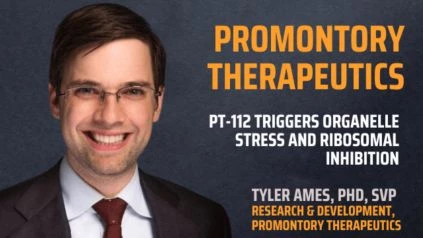By. Tyler Ames, PhD
Date. November 01, 2023
Tyler Ames, Ph.D. in oncology research, delves into the intricate mechanisms of PT-112’s impact on cancer cells and its potential significance in treating metastatic castration-resistant prostate cancer and thoracic malignancies.
Addressing the significance of PT-112’s ability to release damage-associated molecular patterns (DAMPs) and induce immunogenic cell death (ICD), Dr. Ames underscores their pivotal role in the immune system’s response against cancer. The release of DAMPs triggers an immune response, alerting the body to recognize and target cancerous cells, particularly crucial in metastatic and castration-resistant prostate cancer and thoracic malignancies.
When exploring the early molecular effects of PT-112 on nucleolar proteins and gene expression in prostate cancer cells, Dr. Ames emphasizes that the relocation of NPM1 from nucleoli to nucleoplasm serves as a marker of nucleolar stress induced by PT-112. This alteration disrupts ribosomal biogenesis, impairing the cancer cells’ ability to produce essential proteins, ultimately leading to their demise.
In correlation to the disruption of ribosomal biogenesis, Dr. Ames elucidates how the relocation of NPM1 relates to the inhibition of ribosomal assembly. This interference impedes the production of vital proteins, halting the cancer cells’ ability to thrive and propagate, thus showcasing a promising avenue for cancer treatment.
Regarding PT-112’s selective killing of cancer cells, Dr. Ames elaborates on the heightened sensitivity of cancer cells to PT-112 due to their aberrant nucleolar size, overactive ribosomal function, and increased ribosome production. These characteristics make cancer cells more vulnerable to PT-112’s effects, as the drug specifically targets the dysregulated processes within cancer cells, leading to their demise while sparing healthy cells.
In assessing PT-112’s potential as a cancer immunotherapy, Dr. Ames highlights how the findings related to nucleolar stress and ribosomal inhibition could contribute significantly. This may pave the way for the development of novel cancer treatments harnessing immunogenic responses against cancer cells. However, further research and validation are imperative to comprehensively understand and optimize PT-112’s potential as a promising cancer immunotherapy.

